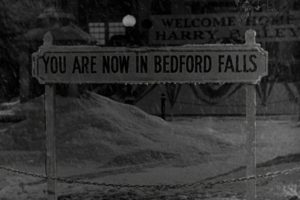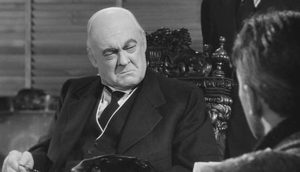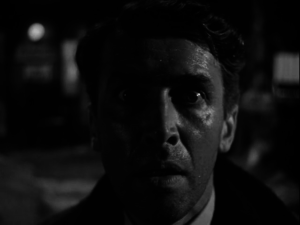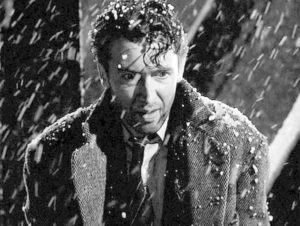During every Christmas holiday I can remember, Frank Capra’s film, It’s a Wonderful Life has been a part of the season for me. The movie is filled with the wonderfully gooey sentiments that many of us eschew during the rest of the year, but the fundamental values it espouses – family, friends, loyalty, generosity, fair play, honesty, inclusion and charity are ideals that for the first time, at least in my memory, seem to be dividing rather than uniting us as a nation.
I’m going to assume here that anyone reading my little essay has seen the 1946 film at least once and will recall George’s enlightenment about the value of his own life, even with all its annoyances and setbacks. That epiphany helps him to stand back enough to see and appreciate his own existence for the transcendent gift it really is, right down to the petty aggravations with which life is also dappled (for all of us).
For reasons that remain a mystery to me, America has, over the past couple of years, changed so dramatically that I feel like a dazed tourist, a stranger in a strange land. Perhaps the angst I observe has always been there, bubbling under the placid surface of our fictional world from TV of the 1950’s, but it has, in any case, come into the open to divide almost as intensely as it did during the American Civil War, which ended supposedly in 1865.
It’s a Wonderful Life shows us two different worlds, one inside the other. Mr. Potter (the “richest” man in town) is almost Dickensian in his “Bah, humbug” view of the world through his utter contempt for a humanity he has cheated mercilessly to achieve his extraordinary wealth. His sneering view of other people is based upon his conviction that anyone who is not financially “rich” must be a “sucker” and stupid into the bargain. George Bailey, however, is Potter’s antithesis in every way.
Recently when I quoted words from the Emma Lazarus poem on The Statue of Liberty, an acquaintance of mine immediately bristled with a contempt for anyone coming into our country “to steal what is ours.” It was a blanket statement on his part, not one that distinguished between legal or illegal entry. I reminded him that few among us were Native American Indians, and that we were immigrants too. That made him even more hostile, as though America were something locked in some kind of vault, and that immigrants were simply breaking into it for selfish gain.
“Give me your tired, your poor,
Your huddled masses, yearning to breathe free,
The wretched refuse of your teeming shore,
Send these, the homeless, tempest tossed to me,
I lift my lamp beside the golden door.”
If you, dear reader, have seen It’s a Wonderful Life, you may recall that hypothetical future of Bedford Falls, that had George Bailey never been born, would become Pottersville, a grubby, vulgar place of shabby crime and suspicion. Now, as I look back at that scenario, I’m struck again by the image of the two, opposing Americas the film represents, the latter a place that somehow we seem to be embracing as our new identity. Political wrangling (from both parties) has embraced a new level of being snide, mean-spirited, and greedy that neither the fiction of Charles Dickens nor Frank Capra could probably imagine.
America has always been “great.” That word “again” on the red ball cap adds nothing but discord and the malevolent, divisive fiction that somehow we had lost our way. The result is that now we are living in two essentially separate nations, one a kind of Bedford Falls…and the other an ever-growing Pottersville.
The next national election may determine which will become our prevailing identity for the next few years, whether we will barricade “the golden door” or lift a lamp beside it, whether we rescue public education (including science) or allow it to crumble into profit-mongering charter schools, whether we ramp up care for the elderly and afflicted or encourage tent cities for the poor while the gluttonous One-Percent drains the last drop of the nation’s blood through misinformation paid for by the unlimited and now private (secret) money through Citizens United.
But despite such scenarios, I still believe we have a chance to survive in an America that belongs to us all and that something from that old spirit of togetherness and national pride can yet unite us so that not even Russia can hinder our continued progress and spirit. JB







